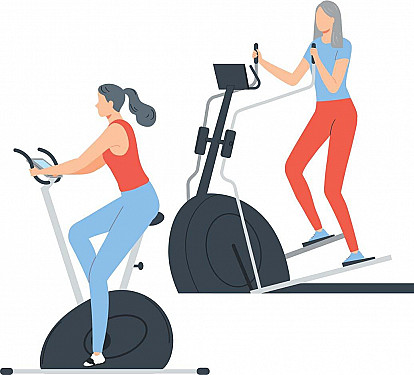How tough is your workout?

Exercise is healthy and safe for most folks. For kids, young adults, seniors, people who are healthy, and people who have medical issues, moderate activity is usually safe and does plenty to improve health, energy, and well-being.
How can you judge the pace of your workout? The easiest way to see how hard you're working is to describe your effort using broad categories, such as light, moderate, or vigorous (see the table below). This categorization, called "perceived exertion," is a good way to help you exercise safely. As you improve your fitness, you'll find your perception of an activity's intensity will change. For example, you might find that you are no longer short of breath when walking up a nearby hill or climbing the stairs.
The table below describes how your body responds to each level of exertion. If you're just getting started with an exercise program, aim for a moderate pace. (If health problems or disabilities make moderate activity impossible, talk with your doctor to figure out a program that will be safe and effective for you.) As you get fit, try a mix of moderate and vigorous activities to help build endurance. Whenever an activity becomes a little too easy, boost the length of your workout or increase the intensity a bit. If you're in good shape, ramping up your workouts and activities can cut time spent exercising and be a real health boost.
|
Perceived exertion: How hard is your workout? |
||
|
Intensity |
It feels |
You are... |
|
Light |
Easy |
|
|
Light to moderate |
You're working, but not too hard |
|
|
Moderate |
You're working |
|
|
Moderate to vigorous |
You're really working |
|
|
Vigorous |
You're working very hard, almost out of gas |
|
If you're just getting started, work your way up slowly to vigorous activities. This is particularly important whether you are unaccustomed to physical activity or you just want to intensify your current exercise routine. Higher-intensity activities raise your chances for muscle or joint injury and very slightly increase the odds of developing a serious heart problem (although the overall risk of dying from heart disease is still lower than if you did no exercise at all).
Whether you want to join a gym, run your first road race, or just feel stronger and better, Starting to Exercise, a Special Health Report from Harvard Medical School, can help you meet your goals.
Image: Ridofranz/iStock
Disclaimer:
As a service to our readers, Harvard Health Publishing provides access to our library of archived content. Please note the date of last review or update on all articles.
No content on this site, regardless of date, should ever be used as a substitute for direct medical advice from your doctor or other qualified clinician.















